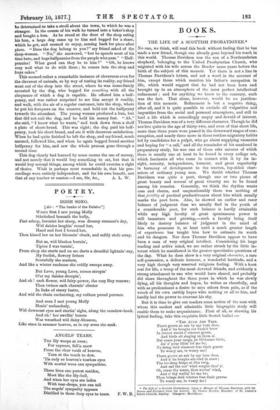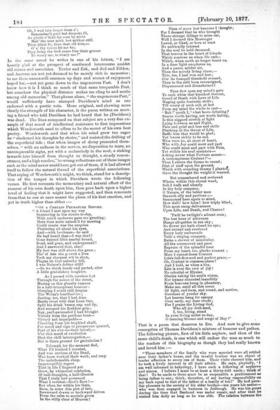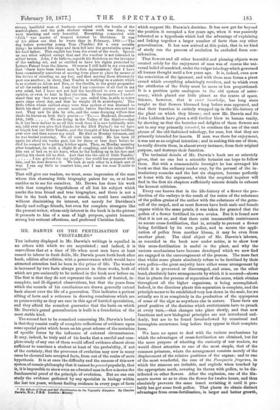BOOKS.
THE LIFE OF A SCOTTISH PROBATIONER.*
No one, we think, will read this book without feeling that he has made a new friend, though one already gone beyond his reach in this world. Thomas Davidson was the son of a Northumbrian shepherd, belonging to the United Presbyterian Church, who migrated with his wife across the Border some years before the birth of the subject of this memoir. Yet there is not a line in Thomas Davidson's letters, and not a word in the account of him, except those which mention his father's occupation in life, which would suggest that he had not been born and brought up in an atmosphere of the most perfect intellectual refinement ; and for anything we know to the contrary, such was the fact. That alone, however, would be no justifica- tion of this memoir. Refinement is but a negative thing, after all, and it is quite possible to exclude all vulgarities and impurities from the social and personal atmosphere, and still to lead a life which is exceedingly empty and devoid of interest. Thomas Davidson was of a very different character. Though he did not live quite to the age of thirty-two, and even of that short life, more than three years were passed in the downward stages of con- sumption, and nearly three more in those restless migratory habits led by candidates for a pulpit, who go about supplying vacancies and hoping for "a call," and all the remainder of his manhood in preparatory study, his was one of those lire natures of which there is usually one at least to be found in every college set, which fascinates all who come in contact with it by its in- sight, serenity, independence, humour, and great superiority in harmony of development to the uneven, lop-sided char- acters of ordinary young men. We doubt whether Thomas Davidson was quite a poet, though one or two pieces of great beauty and several of great vivacity are to be found among his remains. Generally, we think the rhythm wants ease and charm, and unquestionably there was nothing of that fertility of poetical productiveness about him which usually marks the poet born. Also, he showed an earlier and rarer balance of judgment than we usually find in the youth of a considerable poet, for such balance is hardly attainable while any high faculty of great spontaneous power is still immature and growing,— such a faculty being itself likely to destroy balance of judgment in the mind of him who possesses it, at least until a much greater length of experience has taught him how to estimate its worth and its dangers. Nor does Thomas Davidson appear to have been a man of very original intellect. Considering his large reading and active mind, we are rather struck by the little in- terest which he manifested in the greater speculative questions of the day. What he does show is a very original character, a rare self-possession, a delicate humour, a wonderful fortitude, and a very high though very reserved religious feeling. With a keen zest for life, a troop of the most devoted friends, and evidently a strong attachment to one who would have shared, and probably did share throughout the three years in which he was slowly dying, all his thoughts and hopes, he writes as cheerfully, and with as predominant a desire to save others from pain, as if the wreck of his own earthly hopes were nothing at all to him, and hardly had the power to overcast his sky.
But it is time to give our readers some notion of the man with whom this modest and admirable little biographic study will enable them to make acquaintance. First of all, as showing his lyrical feeling, take this exquisite little Scotch ballad :—
"Tan Aura) ASH TREE.
There grows an ash by my boar door, And a' its boughs are buskit braw In fairest weeds o' simmer green, And birds sit singing on them a'. Bat cease your sangs, ye blithsome birds, An' o' your liltin' let me be;
Ye bring deid simmers frae their graves To weary me, to weary me!
There grows an ash by my hour door, And a' its boughs are clad in snaw ; The ice-drap hinge at ilka twig, And sad the nor' wind soughs thro' a'. Oh, cease thy mane, thou norlan' wind, And o' thy wailin' let me be ; Thou brings deid winters free their graves To weary me, to weary me
* The Life of a Scottish Pmbationer, being a Memoir of Thomas Davidson, with his Poems and Extmets from his Letters. By James Brown, Minister of St. James's Saeet Church, Paisley. Glasgow: Maelehose. Oh, I wad fain forget them 8';
Remember'd guid but deepens ill, As gleids o' light far seen by nicht Mak' the near mirk but mirker still. Then silent be, thou dear old tree,- 0' a' thy voices let me be ; They bring the deid years free their graves To weary me, to weary me !"
In the same mood he writes in one of his letters, "I am heartly glad at the prospect of continued intercourse amidst old scenes and associates. Teviot and Esk, and Jed and Eildon, and Ancrum are not yet doomed to be merely rich in memories ; to me these names still summon up days and scenes of enjoyment hoped for,—not yet gone down to the ungenerous Past. I don't know how it is I think so much of that same irreparable Past, but somehow the physical distance makes me cling to and nestle among old memories." That phrase alone, "the ungenerous Past," would sufficiently have stamped Davidson's mind as one endowed with a poetic vein. More original, and showing more clearly the strength of his character, is the poem written on meet- ing a friend who told Davidson he had heard that he (Davidson) was dead. The lines composed on that subject are a very fine ex- ample of that mood of intellectual resistance to first impressions which Wordsworth used to affirm to be the secret of his own best poetry. Wordsworth said that when his mind grew too eager he "slackened his thoughts by choice," and resisted the drifting of the superficial tide ; that when images of decay presented them- selves, "with no sadness in the nerves, no disposition to tears, no unconquerable sighs, yet with a melancholy in the soul, a sinking inwards into himself from thought to thought, a steady remon- strance, and a high resolve," he wrung reflections out of these images such as the mind never could have got out of them, if it had allowed itself to follow the natural thread of the superficial associations. That saying of Wordsworth's might, we think, stand for a descrip- tion of the temper in which Davidson wrote the following verses. He first recounts the momentary and natural effect of the rumour of his own death upon him, then goes back upon a higher level of feeling that it might have suggested, and then remounts from that to one at once nearer the phase of his first emotion, and yet in truth higher than either :—
" ON A CERTAIN PREMATIME REPORT.
"A friend I met upon my way Sauntering in the streets to-day, With rais'd eyebrows gave me greeting;
More than mere tualook'd for meeting
Could create was the surprise Fluttering all about his eyes, And—with hesitance—he said He had heard that—I was dead!
Gone beyond life's tearful bound, Dead, and gone, and underground !
And I answered that, alas!
My foot was still above the grass ; Tho' of late she pi oved a Dun Took my sharpest wit to shun, Plague on that unlucky bill, I was Nature's debtor still!
—So we shook hands and parted, after A little gratulatory laughter.
As I passed with careless feet Through the noises of the street, Mining on this ghastly rumour In a half-triumphant humour : Glorying I could still despise The Worm's familiarities ; Jesting, too, that I had done Battle stout with that Lean One, Spilt his drink 'tween cup and lip, And escaped his fleshless grip ; Nay, part-persuaded I had brought
Victory from the perilous bout—
Victory not impalpable-- Plucking from his trophied skull, For mead and sign of prosperous quarrel,
Part of his o'er-verdant laurel;—
O'er this mood of exultation
Shot the chill interrogation,—
But is there ground for gratulation ?
Triumph for the moment fled, What I'd loathed I coveted, And was envious of the Dead, Who have worked their work, and reap The unfathomable sleep.
Imperceptibly regret That in life I lingered yet Grew, by whimsical confusion, Of half-thoughts, a half-illusion That I truly had possessed What I coveted—God's Rest !— But when far within his Gate, Been, in some dim plot of fate, Downward drawn or backward driven From the calm to mortals given In the stilly clear of Heaven ! Then of more lost heavens I t hought ; For I deemed that he who brought These strange tidings to mine ear, Well I deemed this Messenger Loved, or liked, or bore at least No unfriendly interest In the soul he held deceased.
That heaven in the heart of friends Which receives us when life ends ; Which, when earth no longer bears us, In a finer light enspheres us, And a purer, milder air, Than the merely living share,-.- This, too, I had won and lost ; O'er its tranquil threshold crossed, Then to the cold been reconsigned,.
Dispossessed and disenshrined Thus flew open my mind's gate To each whim that knocked thereat, Greed of Death with Love of Life Waging quite fantastic strife ; Till weary of such coil, at last From my mind the whole to cast- ' Bah !' qnoth I, what boots debating? Scarce worth having, not worth hating„ Is this niggard stretch of light Lying between us and Night, Pain and grief and loss and strife Plucking at the throat of Life, Baffle him that would be glad ; Yet 'twere sickly to be sad. Wise were he, as stout of heart, Who with Joy could meet and part Who could meet and part with Pain, Yet within his soul maintain— Asking never what Fortune meant— A contemptuous Content Thus I strove the theme to round ; Dint of staff upon the ground, Which with sounding thump I plantet, Gave the thought the weight it wanted.
But remembered and reviewed Where, within this choral wood, Soft I walk and silently In thy holy company, 0 Nature, of the better man Staunch ally and partisan ;- Summoned here again to mind, How dull! how false! how triply blind,.
This most smug deliverance Upon Life, and Death, and Chance!
'Twill be twilight's advent soon The last hour of afternoon Hangs all-golden in the sky ; No flower yet bath closed its eye ; And around and overhead Every leafy ambuscade Veils a singing company, Rains a shower of minstrelsy.
All the unreserved and pure Rapture of the splendid hour From my heart, too, plucks consent ; Here I cannot deem Content
Life's fall-flowered and perfect grace,—
Oh, Content is common-place !
And I hold, as when a boy, Life is ever the root of joy !
No celestial or Elysian Glories taking the soul's vision, Nor hymns channted inaudibly From heavens hung in phantasy,
Make me, amid all this ocean
Of light, and form, and sound, and motion,.
Covetous of yonder sky.
Let heaven hang for canopy Over earth, my dear abode ; For I praise the Living God, Who all joy doth send,
I, too, living, stand
In your living midst to-day, 0 teeming blooms and songs of May !"
That is a poem that deserves to live. And now to give some conception of Thomas Davidson's mixture of humour and pathos. The following picture, first of his little nephew, and then of the same child's death, is one which will endear the man as much to the readers of this biography as though they had really known and loved him :—
" Those members of the family who were married were all settled near their father's house, and the invalid brother was an object of tender affection to every one of them. Their visits cheered him, and he took a lively interest in all their affairs. He says, playfully, 'I am well informed in babyology, I have such a following of nephews and nieces. I believe I must be at least a thirty-fold uncle ; think of that 2 To be uncle to three must be as responsible a predicament as being father to one ; think, therefore, of my having responsibility on my back equal to that of the father of a family of ten!' He had pecu- liar pleasure in the society of his elder brother—ten years his senior— who was then engaged in business in Jedburgh. He was his guest during the time that Bankend was under repair, and after that he visited him daily as long as he was able. The relation botween the strong, healthful man of business occupied with the bustle of the market-place, and the pale student whose work was done, was very touching and very beautiful. Everything connected with 'Jack' was matter of deepest interest to Davidson. It was
of his eldest son that he wrote thus in February, 1868 The day before yesterday young Tam (Tombie) did a very notable thing : he tottered five steps and then fell into the gratulative arms of his fond father. This exploit has been the event of the week. Speech on any other subject except that and the weather is not tolerated in either house. John, I do believe, regards his first-born as the inventor of the walking art, and as entitled to have his rights protected by Letters Patent from the Queen. Of course I still hold in my own mind that there have been brave men bcfore Agamemnon,' that I have been occasionally conscious of moving from place to place by means of the device of standing on my feet and then moving them alternately
past one another; in short, that feet, is working on a patent which is as ancient as Adam and Eve, or the Gorilla, or the great progenitor of all the cocks and hens. I say that I as conscious of all that in my own mind, but I have not yet had the hardihood to own my secret opinion, or even to hint in that direction. In the meantime I under- stand that my 'last new nephew,' as you called him, is able to totter more steps every day, and that he weighs 24 lb. avoirdupois.' The little fellow whose earliest steps were thus spoken of was destined to finish his short journey several months before Davidson entered into rest. They now lie side by side, and the same drooping willow-tree sheds its leaves on both their graves 'To— Bankend, December
18th, 1869 We are living in the Valley of the Shadow—that is, it has been darker to us all this week than it is now habitually with me, (did ever you give God thanks for the 23rd Psalm?) for we have at length lost our little Tombie, and the thought of him keeps toddling ever now and then across my mind. He died on Monday forenoon, and he was buried yesterday. We all miss him sorely. He has been ill again for about six weeks past, but for three or four days before he died he seemed to be getting brisker again. Then, on Monday morning after breakfast, he took a slight fit of coughing, and his father lifted him out of bed on to his knee, when he lay looking up in his face and patting his cheek till he died. And that was the end of little Tombie.'
I am grieved for my brother ; the world has prospered with him, and he does deserve it We look at each other in a dumb sort of way. I can say little to comfort him, and I am too near Tombie to mourn.'"
That will give our readers, we trust, some impression of the man whom this charming little biography paints for us, or at least enables us to see for ourselves. Mr. Brown has done his work with that complete forgetfulness of all but his subject which marks the true friend and true biographer, and there is not a line in the book which, to our minds, he could have omitted without diminishing its interest, not merely for Davidson's family and college friends, but even for complete strangers like the present writer, whose only interest in the book is in the picture it presents to him of a man of high purpose, quaint humour, strong but reticent affections, and profound Christian faith.




































 Previous page
Previous page